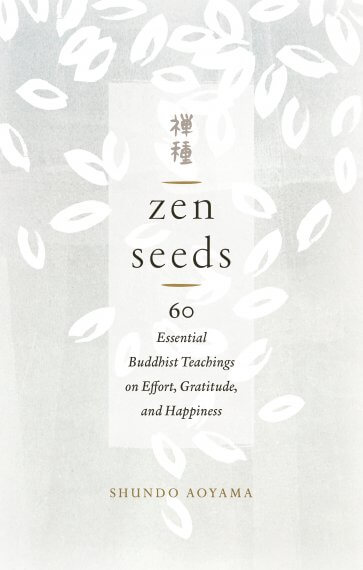
Martin Goodson
Book Review: Zen Seeds
60 Essential Teachings on Effort, Gratitude and Happiness by Shundo Aoyama
With the Covid-19 lockdown intensifying Michael O'Neill finally decided to dive into this inspiring title, finding it a rewarding and comforting experience.

Zen Seeds: 60 Essential Buddhist Teachings on Effort, Gratitude, and Happiness
A year into Covid-19 lockdown seemed like a good time to pick up Zen Seeds. Published in 2019 and sitting in my ‘to read’ pile for nearly a year I found myself reaching for Zen Seeds. I am so glad that I did.
It seems unlikely that there will ever be another Shundo Aoyama. She was presented to the Muryo Temple at the age of five in 1938. Her early life was spent in the study of meditation, the tea ceremony and flower arranging. After a rigorous and highly disciplined training, she was ordained a nun at the age of fifteen into the Soto school. Her whole life since then has been dedicated to Buddhist practice, teaching and running meditation retreats. Her knowledge and experience garnered over a lifetime of Zen practice are distilled into the contents of Zen Seeds, first published in Japan in 1990.
The 60 short chapters of Zen Seeds are not in any discernable linear sequence and can be dipped into in almost any order, free from the notion of narrative or progression. Some themes recur throughout which will be familiar to any Zen student.
She writes of the importance of maintaining self-awareness as fundamental to any contemplative life. As befits someone raised in the Soto tradition, Master Dogen looms large as an influence. “To study the Way is to study the self. To study the self is to forget the self. To forget the self is to be enlightened by all things. To be enlightened by all things is to remove the barriers between oneself and others”.
Much in the book exemplifies this teaching and how it has been made real in Aoyama’s life. She goes directly to the heart all of the difficult and challenging experiences of her life and, through a finely balanced awareness of her emotional reactions, she finds peace and stillness.
When we perceive joy anger, happiness, and sorrow as enriching our lives, just as rocks and tree roots and water spray embellish nature, then we are able to accept whatever happens and live like flowing water, without clinging to anything. P11.
From the outset there is a powerful aesthetic appreciation of the world that is developed through the practice. She writes of sitting still to hear the mountain stream. She urges us to listen to the sounds around us, previously drowned by our distracted thoughts. Over and over, she points to the beauty that is available to us if we only took the time to appreciate it. In this way the smallest, least considered details of our lives can open up vistas of tremendous beauty.
We get a sense of her compassion for the suffering of others in many of the episodes she relates. In one chapter, she writes about a young woman who came on a Sesshin (retreat) and sat with great solidity and purpose. Yet she finds herself speculating on what great sorrow had brought this young woman to the retreat. “Hang on. Do not give in to the storm in your head” she thinks, hoping that she will find a way through. Later she is called to the woman’s room only to find a bloody scene where the poor woman had tried to commit suicide. As Aoyama washes the blood from the floor, she reflects on how it is only when we are driven by such agonies that we turn to religion for help.
She encourages us to see how suffering enriches and deepens our lives just as rocks and mountains enrich a river or a landscape.
“Illness is good; failure is good; let wind and waves be as they are. Growing spiritually and becoming more radiant with each passing day, I would like to live every hour as if it were a day” p44
Although we try to avoid any discomfort, much less pain or suffering, Aoyama warns us that sickness, old age and death are inevitable and should not be shunned any more than they should be sought after. If we engage with our difficulties and see them as our teachers even our most unendurable sufferings can become bearable.
“All experiences enrich and purify us spiritually as well as physically. Joy, sorrow, failure, success, love, and hate all go into the stove of life. We should accept all our experiences and use them to benefit ourselves and other people” p64
It is a little foolish to try to summarize such profound teachings into a few lines, especially when Aoyama’s style is so direct and pithy already. She is a refreshing and reinvigorating voice. I will treasure and mine this book for wisdom for some time to come. I will heed her exhortations to live life in all its colours, with all its light and shade. I will take more time to understand my suffering because, as she tells us, “If people do not meet with sadness or suffering, they will never seek for the true in life. Value, cherish your suffering as your teacher and your guide. “
Reviews
Books, films, exhibitions and assorted media.





















